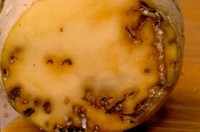Climate change is expected to aggravate the already serious challenges to food security and economic development, especially in developing countries where pests cause 30 to 50 percent of the yield losses in agricultural crops. An increase in temperature could give a greater advantage to the growth of pest populations compared to biocontrol agents (parasitoids) and thus decreasing efficacy of biological control.
Insects cannot internally regulate their own temperature and their development depends on the temperature to which they are exposed to in the environment. For the evaluation, understanding and prediction of the dynamics of insect populations in agroecosystems models have become important analytical tools and are used in phytosanitary risk assessments. The International Potato Center (CIP) has developed a temperature-driven phenology model for the potato tuber moth (Phthorimaea operculella) that provides good predictions of population growth for the wide range of climatic conditions were the pest prevails today. Linked with geographic information systems (GIS) and atmospheric temperature the model allows simulating risk indices on a worldwide scale to predict future changes of the species distribution due to global warming.
The approach applied for the development and prediction of P. operculella can be utilized for other insect species. Therefore, CIP has also developed Insect Life Cycle Modeling software (ILCYM) to facilitate the development of insect phenology models. ILCYM consists of three main modules: The “Model builder” is based on life table data derived from constant temperature studies; the “Validation and simulation module”, uses insect life tables established at fluctuating temperature conditions; and the “Potential population distribution and risk mapping module”, is implemented in a GIS environment that allows for spatial – global or regional – simulations of species activities and mapping.
A collaborative effort to develop innovative phenology modeling and risk mapping to understand the effects of rising temperatures on the distribution and severity of major insect pests on important food crops in Africa is being carried out by the three international research centers – the International Potato Center (CIP), International Institute of Tropical Agriculture (IITA), and African Insect Science for Food and Health (ICIPE) – as well as, the University of Hohenheim, Germany and partners at NARI in Africa, funded by BMZ Germany. In this project, the ILCYM software will be further improved and adapted to cover a wide range of insects of different orders and families. The results will contribute to fill the current knowledge gap about climate change effects on economically important insect herbivores and their natural enemies, especially in the tropics.


